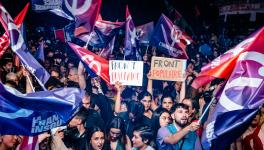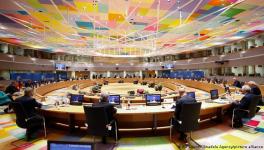The Greek and French Elections: Left Gains Significant Ground
The Greek Elections
While the left parties have gained a lot of ground in Greece, getting more than 35% votes, so has the extreme right – they have also polled about 20% votes.
The left secured a total of 35.5% – 17% for Syriza (51 seats), 8.5% (21 seats) for KKE (the Communist Party), 1.2% for the anti-capitalist left party Antarsya and some 6.1% (10 seats) for the Democratic Left (more social democratic in its positions) and 2.9% for the Greens. The Right, and by this we mean the hard right, as distinct from the two supposedly centrist formations, which have also been drifting rightwards, consisting of Independent Greeks, LAOS, and the neo-Nazi Golden Dawn, polled respectively 10.6%, 2.9% and 7%. The collapse has been of the two centrist formations who ran the brutal austerity regime – the centre-right New Democratic Party and Panhellenic Socialist Movement (Pasok), the social democratic formation of George Papendreou. While they had polled about 77% of the votes in 2009, this time they polled only 32% of the votes. New Democracy, has dropped from 33% in 2009 to 19% even though has increased its seats from 91 to 108 due to a bizarre provision in Greece that gives the largest party a bonus of 50 seats. Though the parties fight for 250 seats, the strength of the Parliament is 300 due to this strange rule. Pasok has lost more than 31% vote share, dropping from 44% to a meagre 13% and from 160 seats to a paltry 41.
The New Democratic Party has given up trying to form a government. With this, the baton to form a government passes on to Syriza as the next largest party. Given that KKE has stated it will not join hands with other left parties, Syriza is unlikely to succeed to either. Unless the Democratic Left joins with New Democracy and Pasok, the chances of a new government is dim and we may see another elections quite soon.
The KKE however, considers Syriza to be “revisionists” and believe that they are creating “illusions”, while Syriza would regard KKE to be a “sectarian” and a “dogmatic” party.
The KKE has been instrumental in not having an united left call for forming a government, which could repudiate the Greek debt and reject the austerity program coming out of Brussels. In Greece, as in most of Europe, this is the immediate issue. Instead, KKE's position of joining the other left parties only if they agree to immediately leave the Eurozone, does not appear a reasonable response. It can only lead to either its own marginalisation or shifting the focus away from the left as a whole in the next elections .
The classic tactic of the right is to turn the anger of the people away from capital towards vulnerable sections that can be easily identified as the “other”. If it was anti-Jewish earlier, it is now anti-black, anti-brown and virulently anti-Muslim.
The French Elections
France has also shifted to the left, al beit less so than Greece. The victory of the soft spoken 57-year old François Hollande over Nicolas Sarkozy has been read again as a rejection of the austerity and high unemployment line of Sarkozy. Sarkozy's bellicose foreign policy, with macho posturing with military interventions in Libya and an attempted intervention in Syria did not help him get over the French electorate’s dislike of Sarkozy. If Hollande was bland, Sarkozy's in-your-face politics did not help him win too many friends either.
However, if we take the gains made by the left in France, even after discounting the victory of centre-left Hollande 30 years after Mitterrand won the French Presidency as a Socialist Party candidate, they are considerable. The left together with the greens, won more than 15% of the votes, with Jean-Luc Mélenchon, the candidate of the Left Front winning 11.1% votes. It is after a long time that a left candidate in France has got over 10% of the votes.
The key issue before Hollande is how far will he take his publicly articulated position against the austerity package coming out of Brussels? Will he cave in to Angela Merkel's rejection of his demand for a more growth oriented economic policy? Or will he become, as Pasok did in Greece, a care-taker of the neo-liberal regime in practice, while making critical noises? How far will he go in opposing Merkel is the key to his and France's future.
The more likely scenario is that Hollande will do what Mitterrand, his socialist predecessor did – succumb to global financial capital. Anything else requires much greater commitment than the Socialist Party in France has shown for a long time.
Get the latest reports & analysis with people's perspective on Protests, movements & deep analytical videos, discussions of the current affairs in your Telegram app. Subscribe to NewsClick's Telegram channel & get Real-Time updates on stories, as they get published on our website.
























